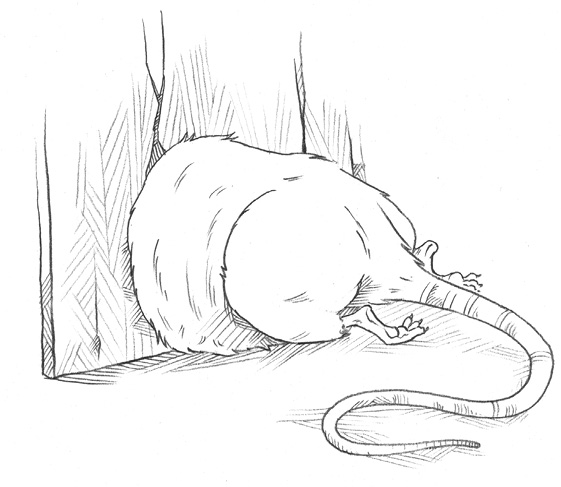He tracked the waft of food smell to the small door and along the bottom of it. At the hinge end, the base of the door was splintered. He could stick his head through. Cheese, cheese, duck fat, cheese – the smell was powerful now. He wriggled and pushed and breathed all the way out and tumbled through the hole.
As he fell through, the door rattled and a key slipped from the lock. It clanged like a dropped fork when it landed on the tiles.
‘What’s happening?’
Doug didn’t even notice Al’s voice or see the torchlight under the door. He was halfway to the kitchen with his mind on nothing but food stink – vegetable peelings, crispy fried anything, tubs of lard.

Al could see the key glinting in the torchlight. He took a wire coat hanger from his bag, twisted it into shape and hooked the key.
‘Genius,’ he said as he stood up. ‘Super Rat.’ He unlocked the door and pushed it open. ‘Hand Doug the keys to the getaway car, Lex. I think he’s got it covered. And it looks like the coat hanger was useful after all.’
‘Yeah, okay.’ Lexi had argued with him about it, saying she didn’t think they’d get much time to hang clothes. ‘You get credit for the coat hanger, but I’m pretty sure Doug’s role in that was a total fluke.’ She peered down the hallway, but Doug was nowhere to be seen.
They found him in a kitchen bin rolling on some leftover quail.
They lit a gas lamp and ate bread from a basket of rolls and loaf-ends, while they worked out what to cook.
‘Still totally fresh.’ Al wouldn’t have cared how stale it was – he’d never been so hungry in his life. ‘They probably bake every day.’
The fridge at home was always full. The next meal was only ever hours away. There was always fruit in the bowl whenever you wanted it. Food was something you could assume would be there. It had scared him, he realised, to be without it. It was worse than the hunger, thinking about food and having no idea when you might find some – or if.
He cooked a huge omelette, while Doug stuck his face in a bowl of congealed duck fat and Lexi kept watching the portal.
They ate all they could and then filled Al’s bag with bread and cheese and jars of things that were labelled in French and that they didn’t even recognise.
They locked the door on the way out and Al slipped the key back under it, where it would look like it had fallen sometime during the night.
Al took the next shift – two hours or as close as he could make it, staring at the portal, while Lexi slept on some empty sacks. Much of the time he stood with the bar of soap in front of him on a head-high windowsill. He thought about Grandad Al and the old photos and New York in the 1860s and sleep. He particularly thought about sleep. And then his mind snapped back to the portal and to his fear of losing it. He was wide awake again, focused.
They saw the night through in two-hour shifts and caught up on sleep the next day, still one at a time with the other watching the portal.
By the second night, whoever was sleeping dreamt only of the glowing button, blinking, fading, slipping beyond reach.
The OK soap ads appeared the next morning and all that day the portal glowed even brighter.
‘It’s like jetlag,’ Lexi said as she stretched her arms and legs after a sleep.
Al was eating bread and cheese. ‘Yeah, I know. I feel like someone could take my appendix out now and I wouldn’t notice. I don’t think I can go on much longer.’
It was late afternoon.
By nightfall, when that day’s edition of The New York Times was off the newsstands and there were few new readers for it, the portal started to dim. Then a crack appeared.
‘Now,’ Lexi said, shaking Al’s shoulder. ‘We need to go now.’